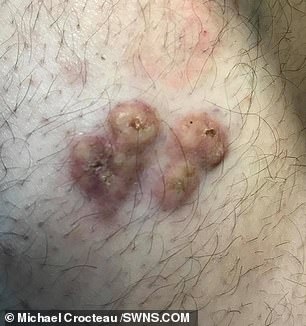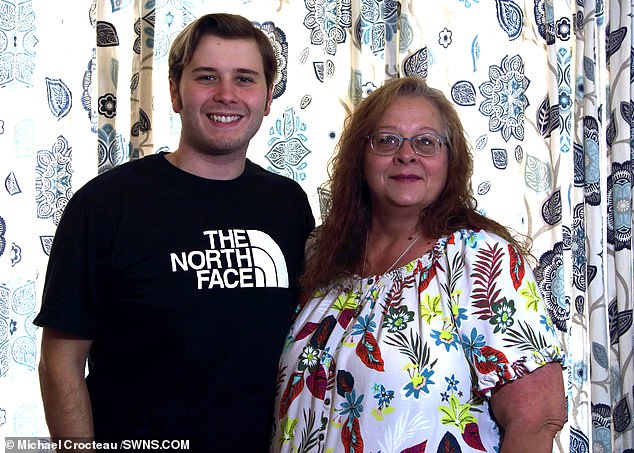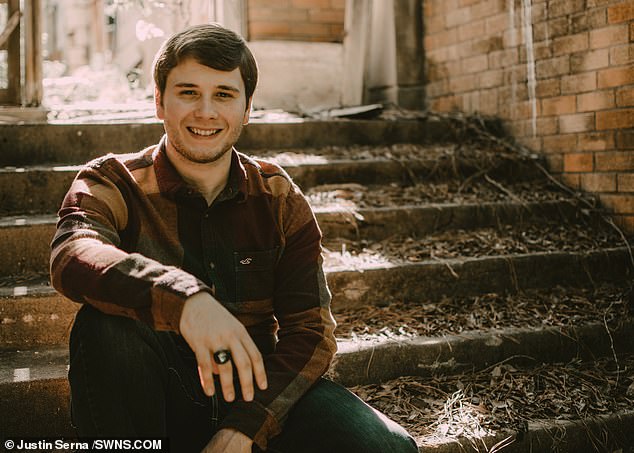Nursing student, 21, are diagnosed with rare incurable cancer after mistaking his symptoms for an ingrown hair
- Michael Croteau, 21, found an ingrown hair on his right thigh in September 2017
- Around Christmas, it started to change color and appear infected
- In spring 2018, he was told he had pseudomyogenic hemangioendothelioma
- It is an extremely rare cancer that affects just one in one million people
- The nursing student of Overton, Texas, says he doesn’t know how long he has to live
A college freshman was shocked to be diagnosed with an incurable cancer after mistaking the symptoms for an ingrown hair.
Michael Croteau, 21, was diagnosed with pseudomyogenic hemangioendothelioma (PHE), an extremely rare cancer that affects just one in one million people, according to the EHE Foundation.
The student started experiencing tightness in his right knee and quadriceps during summer 2017 and developed what he believed was an ingrown hair on his right thigh that September.
Michael and his mom Susan Williams, 52, a nurse, became concerned as it began to grow, change color, and appear infected when he returned to college after Christmas.
Michael, of Overton, Texas, went to a dermatologist, who warned it could be something sinister, but referred him to UT Southwestern Medical Center in Dallas for a second opinion in April 2018.
The Kilgore College student was devastated when, in May 2018, his various MRI and CT scans revealed the rare cancer, which affects the skin, muscles and bones, and is diagnosed in fewer than 100 Americans a year.


Michael Croteau, 21, was diagnosed with pseudomyogenic hemangioendothelioma (PHE), an extremely rare cancer that affects just one in one million people

He developed what he believed was an ingrown hair on his right thigh in 2017
Micheal was frightened to discover that his cancer had developed into hundreds of tumors which had moved into the bone, muscle and tissue of his right thigh.
Michael said: ‘I could feel it underneath the skin, it felt like there was pressure.
‘I had never had [an ingrown hair], but I didn’t really know what else it could be.
‘I did dig at it, but there didn’t seem to be a hair there.’
He never suspected cancer.
‘It was a real shock,’ Michael said.
‘It was something I never thought would happen to me, especially at this age.’
Michael was frightened when doctors began to explore the possibility of amputation, but the surgery was eventually ruled out by an orthopedic surgeon.
Doctors in Houston’s MD Anderson Cancer Center decided to treat Michael’s tumors with an experimental oral chemotherapy drug and the student underwent a course of radiation therapy on this thigh to manage the pain.
While Michael’s cancer is currently incurable, the aim of his chemotherapy treatment was to halt the growth of his tumors.
Sarcoma is generally slow-growing and there was a small risk of it spreading like wildfire. It doesn’t usually respond well to chemo or radiation.
‘The options I was presented were amputation from the hip down, or to just monitor it and hope it didn’t grow or spread. There is no cure.
‘We have chosen that option.’
Susan said the lack of research around her son’s cancer has been devastating, and her family has no idea how his illness will progress.

Michael and his mom Susan Williams, 52, a nurse (pictured), became concerned as it began to grow, change color, and appear infected when he returned to college after Christmas

More than a year on from his diagnosis, Michael is relieved his tumors haven’t become larger, but he does worry about the future
‘Right now Michael is receiving palliative care. It’s absolutely devastating to hear there is no cure for your 20-year-old son who just finished high school,’ Susan said.
‘We don’t know how long he has. It could be one month or six years.
‘Currently they are monitoring the spots on his lungs. But he will always be living with cancer which is the toughest part for our family.
‘Because it’s so rare, there is not much research being done on it, so for us it’s a waiting game.
‘Right now the focus is to give Michael the best quality of life he can have.’
More than a year on from his diagnosis, Michael is relieved his tumors haven’t become larger, but he does worry about the future.
Michael’s doctors have also noticed two tiny spots on his lungs, which are currently too small to biopsy.
Michael said: ‘The goal is to live a normal life for as long as I can.
‘My tumors have remained the same. They haven’t gotten any smaller but they haven’t gotten any bigger either.
‘It’s so hard to tell what will happen because there is not much research into my type of cancer.
‘They aren’t sure how it will develop in the future.
‘It’s a scary thought because it’s impossible to plan for.
‘I try not to think about it and live each day as best I can. But there is always this big ‘what if’ over my head.
‘Right now we are monitoring my tumors every four months with MRIs, CTs and blood work.’
Despite his illness, Michael continued his studies in Kilgore College, where he is on course to begin a nursing program in the autumn.
The future nurse warned other students to be proactive should they discover any unusual change in their bodies.
Michael said: ‘If you notice anything out of the ordinary with your body, get it checked.
‘Early diagnosis can be the key in the treatment of so many cancers so if you notice something wrong, go to your doctor.
‘It could be the thing that makes the difference and save your life.’
